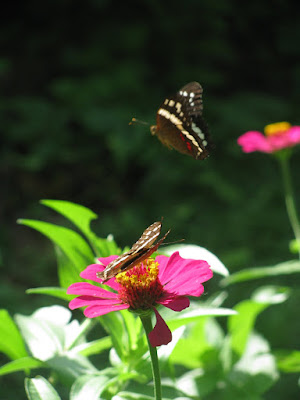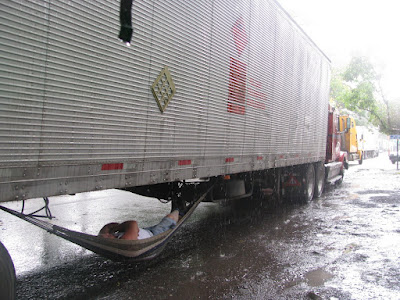Jen and I crossed into Costa Rica about 3 weeks ago in the middle of a torential downpour. It was raining so hard that it changed our plans. We were originally going to head for a world-famous cloud and rain forest reserve called Monteverde, but it was raining so hard for so long that we decided to bypass it (for the time being) and head to San Jose, the capital, to meet up with an old friend of mine, Jose. Jose and I met 4 years ago, in Vietnam. He'd invited me, mi casa su casa sytle, for the last 4 years, and I finally meant it. And he really meant it to, he and his family welcomed us into his home and were the best hosts that we could have imagined.

(4 years ago, Vietnam)

(2 weeks ago, Costa Rica)
Jose had a car and some time, so we were able to ride around with him and see way more of the country (and in more style). Too much happened to really go over it in much detail. I'll do a show and tell of some of the highlights. I wish I could do a scratch and sniff, but the internet just isn't up to sniff yet.

(road trippin')
Costa Rica, what we saw of it, and I assume what we didn't, is an incredibly beautiful country. It's very lush, at least in the rainy season. They've put a tonne of money into conserving their environment, usually in the form of nationional parks and reservations. And in these places, we saw wild, wild animals. But, for you, dear readers, in the face of danger I managed to take some death-defying pictures. Now, I shall make them known to the world:

(wild slug)

(a very wild, wild boar)

(wolf spider)

(wild tarantula - this picture was taken just minutes after I ate his comrades)

(wild cows, and alligators - this picture was taken just minutes after I successfully wrestled some of the biggest alligators in this alligator posse)

(mccaws in the wild - I harmed these in no way shape or form)

(old monkey - there were other monkeys, and other monkey pictures, but they were so not pg-13. Everybody knows doggy-style, but have you ever seen monkey style? *hubba hubba*)
Of course, we paid hommage to the awesomeness of mother nature too. And we let her know, as all humans should, that we're on side with nature. We've done enough damage to this planet, time to give it some love, no?

(now THAT's a tree)

(still treehugging)
Naturally, we followed the Bible of Travel (aka, the Lonely Planet) to all of the places that we, as tourists, should not miss.
These included a volcanic crater (Irazu)...

(Irazu crater)

(top of Irazu - "Hey guys, let's all stick our fingers in our noses, it'll be funny" -- Jose & Jen)

(it was c-c-c-cold up there, and the clouds blew in as we watched)
Then, we went to the Orosi valley. You shoulda seen the pictures that were advertised of this place. They were incredibly beautiful. There was a giant lake, and a river that runneth into it. However, they forgot to put the asteriks' beside it. If they had, it would've read:
*lake drained once a year to clean the accumulated silt
** takes 4 months or so to look beautiful again
*** will happen in early September
Turns out that the lake was drained the day before we showed up. So, instead of the magnificent view, we decided to sleep on the side of the hill, and enjoy the weather.

(chillin' and hillin' in the Orosi valley - missing lake out of view to the left)
Later on, we went to the Caribbean side. This was my favourite part of Costa Rica -- the beautiful long white sand beaches, the big puffy white clouds, the caribbean vibe and food, and just the whole vibe. We rented some bikes and rode up the coast, popping in to all the beaches on our trip. There was hardly a soul on one of them.

(bike ride)

(caribbean beach)
Then the three of us took off for Arenal, home of the famous Arenal volcano. Arenal is famous, because it's gone off almost every day for the last way too long, allowing tour-groups to watch the lava flow down the side from a safe distance. Unfortunately, when we were there (only for 1 night), we arrived a little too late to go on one of these tours. Thankfully, our souls weren't crushed, it was cloudy and you couldn't really see anything anyway.

(Arenal volcano)
On the way up we decided to take a canopy tour. This involves putting on a snug-fitting harness and putting your faith in the ability of complete strangers to secure you correctly to the metal line that is the only thing separating you from a 100 foot fall to the ground as you zip from platform to platform among the giant trees. Yessss!

(zipline)
On another note, we smushed ourselves in the sand on both coasts too. White sand, black sand, I love them both. I don't care about the colour of the sand. Neither sand makes the best tooth-paste. But don't just believe me, you can only truly understand something once you have experienced it experiencially.

(full body / lookin' good)

(black face)

(white face)

(sandy face Jose)
Back in San Jose, the Costa Rican capital, we decided to take in some culture. There was a 14 year old Costa Rican boy putting on a Chopin piano concert at the National Theatre, the nicest building in San Jose.

(fancy theatre)

(fancy piano)

(very elegant)

(very elegant - note how the pants don't cover the socks.)
And on that note, I will conclude this entry.
The sun has set on my latest adventure.

(Jaco sunset)
It's time for me to make some decisions about my next move. Anybody have any suggestions? Please, do email me! I'm open to all options at this point. If you have one, or know of one, please do let me know, I'd appreciate it.






















